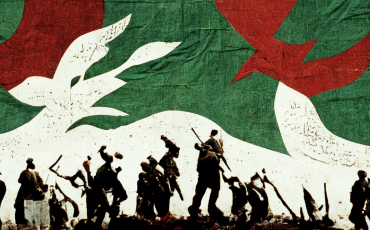In the future, anyone seeking protection in Europe will have to come as a skilled worker – or accept violence and detention. What is being celebrated as a historic compromise shows neither political foresight nor empathy for those affected.
On June 8, 2023, the interior ministers of the EU member states agreed on a joint position in the negotiations on the Common European Asylum System (CEAS). At the heart of the new position are mandatory screening procedures at the EU's external borders - those who are not deemed entitled to protection will be deported.
The likelihood to be accepted largely hinges on the country of origin, the age, and the vulnarability of the asylum seeker. Another factor is highly relevant: “The second criterion will be whether the people concerned entered the country via so-called safe third countries. The EU can determine these at its convenience. The classification of Turkey, Tunisia, and some Balkan states, for example, would cover practically all arrivals,” Christian Jakob summarizes for the taz.
For these new 'quick checks', the arrivals are to be detained in camps, Karl Kopp of Pro Asyl confirms: “Experience shows that procedures at the border lead to humanitarian abuses, poor procedures and ultimately to a denial of protection.”
But who is investigating the violence at the borders?
As EU institutions engage in discussions about how borders can "filter" ever more effectively, the deaths of migrants are already facotored into the equation. This becomes evident when we look at the current practice: there is FRONTEX, the border management agency, which has been able to demand further budget increases despite massive scandals; there are mass documented violations of the non-refoulment principle in EU member states; there are proven reoccuring violations of human rights in the camps on the European side of the external borders, such as on Lesbos.
There, the organization Doctors Without Borders sounded the alarm in May, because more than 900 people disappeared from the island since the beginning of 2022, the doctors assume that these people were illegally deported to Turkey. Cases of rescue operations where shipwrecked people were refused help is systematically documented by NGOs such as WatchTheMedAlarmPhone. Ending these human rights abuses is not treated as a core objective of the current debates on the CEAS.
If one follows the debates about the asylum system, it appears that the topic of migration has been answered once and for all with the ever-increasing restriction and punishment of illegalized mobility. The motto, so it seems: Out of sight out of mind. The ever-tightening "objective criteria" used to restrict access to seeking asylum does not make the detention of people in camps any better.
Pushing the border beyond the Mediterranean
Also, in the Sahara between Niger, Algeria, and Libya, people die at and through borders. Alarm Phone Sahara has been documenting deportations from Algeria since 2018, as well as the consequences of EU policies in Niger. They shed light on how EU policies within the African continent have led to the criminalization of border crossings that are legal through West African Economic Community (ECOWAS) free movement agreements. These often circular migratory movements have shaped everyday life in the region for centuries; to this day, 80 percent of migration through the Sahara is intra-African migration.
Further, in its new plans for the CEAS, the EU resorts to states beyond the Mediterranean. This time by saying: Anyone arriving at the EU's external borders through a safe third country is not eligible for asylum. But what does that mean in practical terms?
‘Safe Third Country’ Tunisia: both migrants and Tunisians leave the country
Let’s take the example of Tunisia. From the migrants' perspective, Tunisia was relatively liberal; even after 2011, many Africans were able to work and study in the country, whereas this became unimaginable in Libya, for example. Today, twelve years after the democratic revolution, Tunisia is on a straight path to becoming a dictatorship again. In addition to domestic political repression, President Kaïs Saïed lost it on February 21, 2023, spreading conspiracy theories of population exchange through state-controlled media and agitating against Black people in Tunisia.
The consequences were drastic: many Black people lost their homes, and their jobs, and there were outright purges in the streets. West African countries evacuated their nationals. Although the rhetoric has calmed down somewhat since then, many people remain homeless and without income. Some of them have organized, tweeting at @RefugeesTunisia about deadly racism and the UN's denial of aid. Others took the escape route across the Mediterranean. Arrival numbers in Italy were rising. It seems clear: Tunisia is not safe.
The visit of Mark Rutte, Ursula von der Leyen, and Giorgia Meloni to Tunisia's President Kaïs Saïed immediately after the decision to tighten the asylum system stands in stark contrast to this. Their offer: close economic and migration management cooperation. Critical journalists were not allowed to attend the press conference concluding the visit.
Another 'safe third country' is Turkey. In the much-discussed presidential election campaign, both main candidates promised their voters that all Syrians living in the country would be sent back as quickly as possible and that they would cooperate with Bashar al-Assad to this end. For many of them, this means, in the worst case, the renewed loss of their home and further persecution. Depending on how quickly the plans are implemented, Turkey is not a safe place for them. The same is true for Afghans, who were deported directly into the arms of the Taliban even before the election. Recep Tayyip Erdoğan's extended term in office also means that refugees from Turkey will not be able to return for the foreseeable future, and even more opposition figures, Kurds, and journalists may have to leave the country in the coming years due to repression.
By naming and defining countries as ‘safe third countries’, the EU will in the future deprive even people with a good chance of obtaining protection status of the right to asylum. If these people are then deported from the ‘safe third countries’ back to their country of origin, which would not be possible under EU law, the EU bears no legal responsibility. People are faced with the existential question: Where are we safe? The pressure to find a new, safe place is increasing.
Using violence to protect borders also means there is more violence to escape from
Meanwhile, the EU is repeating old mistakes. Already in 2015, the so-called long summer of migration was no surprise for migration researchers. At that time, international funds for the support of Syria's neighboring countries were cut, and the situation for refugees there deteriorated rapidly. In December 2014, the World Food Program was forced to shut down its food voucher system for Syrian refugees in Syria and neighboring countries. This was due to a shortfall of 89 percent of its budget caused by a lack of promised payments from the international community. The organization warned about the disastrous circumstances and increasing migration. In the EU, the developments were not seen, or it was assumed that heightened border 'security' measures were the solution. Both were politically short-sighted. Instead, stabilizing and supporting the countries beyond the external borders while opening legal escape routes would have avoided many tragic accidents and lifetimes waisted in camps.
For another example of European short-sightedness, it is worth looking at Sudan. Two generals have been warring in the country since April 15, 2023, to the suffering of the civilian population. One of the factions, the Rapid Support Forces (RSF), was created in 2017 by long-term dictator Omar al-Bashir. The unit was initially known before as the Janjaweed butcher militia. Why the name change? For the first time since the 1990s, Sudan's diplomatic isolation was broken by European parties through the Khartoum Process beginning in 2014 to negotiate cooperation to enhance Sudan's border management.
It was only through this process and the European funding of these new "border guards" that the RSF was able to become an independent, armed entity within the Sudanese power structure. Thus, people are forced to flee Sudan for neighboring countries now, partly because of the EU’s focus on financing repression against migrants instead of supporting progressive forces in their struggle for democratic participation and civil governance.
Germany wants to be attractive for skilled workers and sends refugees to Camps at its outer borders
It is the friends and relatives of the migrants affected who pay special attention to these developments in the EU. Many of them have materially and legally settled, so they would have the means to support their loved ones and bring them to Germany. When asked, the Baden-Württemberg Flüchtlingsrat (Refugee Council), among others, says there are "still not many options." A family reunion is usually only possible for members of the immediate family, and the same applies to admission programs. Visit visas are a "very theoretical possibility." What remains are student and work visas, which require lengthy processes including learning the language. Legal paths for emergencies do not exist.
The desire to "protect" the border at all costs is currently contrasted with the effort to welcome so-called skilled workers to Germany. This distinction between desired and undesired migrants is a dead end which even the German Green Party has now ended up in after all the promises the party has been making regarding human rights and migration in the past. Trying to attract the much-needed skilled workers from a neo-liberal rational does not pair well with racist border and asylum policies targeting refugees.
This framing of migration, together with the EU border regime, must be declared a failure overall. Although it seems impossible to limit the rights of migrants even further, migration does not stop. With the EU reform, the border and thus the political challenges of handling migratory movements are shifted more and more to the "Global South" - that cannot be considered a solution.





















